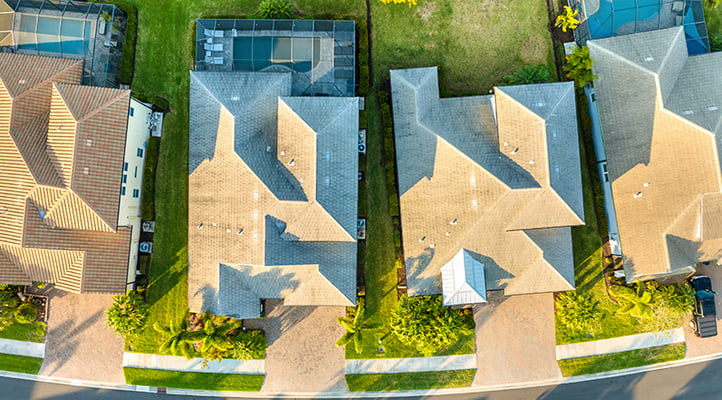- Home »
- Learningcenter »
- Insurance approved roofing materials
Insurance-Approved Roofing Materials for Atlanta Buildings

Atlanta's summer hailstorms can wreck a heavy-duty roof in no time, and they can also leave you with some tough decisions to make. You'll usually need to sort through city codes, and you also have to manage your HOA guidelines. You have to make sure that your insurance needs are met, and you'll actually see options for weather-resistant materials. It can make you feel nervous - especially once you start doing the math!
You need to make sure that you get the permits. You should look for approval from your HOA (what a process) and you should double-check that your chosen options line up with your insurance policy.
When those big Georgia storms hit, you'll feel more at ease knowing you've covered every base. Once you've done that, you're in a good position to manage whatever the weather brings.
Let's get started on how you can move forward from here.
Code And Permit
Chapter 24 of the city code spells out which roofing materials your insurance will actually cover! Building owners often don't realize that even though some materials may sound fine, they can void your insurance policy. In Atlanta, you also need to make sure that your roof meets the city's fire safety laws. You have to actually use a material with a Class A, B, or C fire rating.
You'll need to get a permit before you can start any roofing job in Atlanta! Most permits take about two to three weeks from the time you apply until you get the official go-ahead. One contractor told me about a client who decided to skip the permits and just replaced a commercial roof on their own. Down the road, when a storm caused damage, their insurance company completely denied the claim.
The city inspector usually comes out twice during a roofing project. The first visit is to check the underlying structure, and then they return to look over the finished roof when it's all done. If you miss these inspections, you could end up needing to pull apart sections of your new roof just to prove that the work was done right - what a nightmare. That gets expensive really fast, and insurance companies don't like to work with situations like this.

You should hold onto the paperwork from the tear-off and rebuild process. Insurance companies often come back to ask for this documentation if you're filing claims years down the road. I know a business owner downtown who lost thousands because they couldn't show proof that their contractor was the one who removed the old roof. The insurance adjuster completely denied the claim.
For most commercial roofing projects in Atlanta, permits usually cost between $350 and $500, a small cost compared to what you might end up spending if something goes wrong. Some owners forget to add this to their budget and end up panicking when inspectors show up. The city also does surprise inspections on most commercial roofing jobs.
Insurance companies have become much pickier about which roofing materials they'll approve. No wiggle room here. At this point, you need to show clear proof that your roof lines up with the local building codes. Options like metal roofing, standard shingles, and modified bitumen are usually accepted for Atlanta buildings. The weather in our area puts different materials to the test, and some materials work better here than others.
HOA Rules And Restrictions
Homeowners associations in Atlanta shape what you can put on your roof - these laws can vary quite a bit. They set rules about roofing materials to help the neighborhood look uniform. Just to give you an example, you could be limited to types of asphalt shingles or find that metal roofs aren't allowed. You'll see that laws change from one community to the next.
In one subdivision, all roofs have to use architectural shingles, and only earth tones are allowed. Over in Buckhead there's a community that'll need you to choose slate or slate-look materials - these have to be gray or black. These differences can make it tough to find a roof your insurance will cover and your HOA will sign off on.
Neighbors often care about the look of your roof, too. There are stories about homeowners who spent thousands to install a new roof and then had to resolve disputes with upset neighbors or a frustrated HOA board. You might install a heavy-duty roof that your insurer approves, only to have the HOA reject it. In that case, you could pay for a second roof, which is twice as expensive.

You also need written approval from your HOA before you start any roof work. One of our clients in East Cobb went through this process not long ago. She picked a quality new roof and thought she got the shade right. However, the HOA forced her to tear it off and replace it because the color was slightly off from the agreed sample.
HOAs will ask you to submit a few samples. They might need a few weeks to go over everything - this waiting period can be pretty frustrating if your roof happens to be leaking.
If you break your HOA's roofing rules, it can cost you more than you might expect. It's crazy but true. Some associations will hand out fines until you fix the violation. In some cases, they can also place a lien on your house if you don't comply. These penalties can pile up fast and turn a roofing project into a far bigger predicament.
Insurance Provider Compliance Steps
Your insurance company starts by sending an adjuster to inspect your roof claim before they pay anything. This person checks your roof for damage and double-checks that the storm caused your repairs. You can run into complications if you use materials your insurance policy doesn't allow. Some roofing companies in Georgia will even turn down a job for that reason.

Most insurance policies limit what they'll cover for roof replacements. If you choose something more expensive, you pay the extra cost yourself. You might see a section in the policy called ordinance-or-law coverage. It kicks in when local laws change, and you need stronger materials for your roof than you used before.
Think about what happened to my neighbor Mark last year when a big storm hit town. His old three-tab shingles weren't available anymore. The building codes had changed too. The insurance company covered new architectural shingles for him. He didn't have to pay the price difference because the ordinance-or-law part of his policy stepped in to help.
Some homeowners wonder if impact-resistant shingles can lower their insurance rates. It depends on your insurance company. Some will take as much as 30% off your bill - a nice discount. Others barely change it at all. Also, bring this up with your agent to see what the numbers look like before you buy new materials.
Ask which materials they recommend and find out what kind of records they'll want for the claims process. Most carriers need clear before-and-after photos plus documents like your roofer's contract and work permits.
Try a roofer who's experienced with insurance claims and follows the right procedures. A reliable one will take photos as the project moves along and give you an organized file to submit to your insurance company. When you have this file ready, it helps speed up your claim.
Approved Roofing Materials Compared
Asphalt shingles show up on most Atlanta homes, and you'll see brands like GAF, CertainTeed, and Owens Corning at the top of the list. These shingles reliably handle Georgia's heavy summer rain and sudden winter ice. Insurers like them because they've been tested for fire and high winds.
You also get a couple of options here: standard 3-tab shingles or architectural shingles. The 3-tab kind fits Atlanta bungalows and is pretty affordable. Architectural shingles may cost a little more. But you can expect them to last longer and stand up to stronger winds. The Johnsons, who live on Peachtree Street (a charming stretch), chose architectural shingles after last year's big storm damaged their roof.

Metal roofing is more common in Atlanta's newer neighborhoods. It requires a bigger upfront investment. But you can expect it to last twice as long as asphalt. Stand-seam metal roofs give modern homes a sharper look, and they hold up in harsh wind storms. Some insurers might even give you discounts if you choose metal since these roofs handle fire and bad weather better than other options.
If your roof is flat or has a gentle slope, you'll need to use another material. That's where TPO and EPDM membranes come in. These rubber-like systems are designed to seal out water, and they don't break down under Atlanta's strong sunshine. They are impressively sturdy indeed. You'll find these materials on commercial buildings all over town, and they hold up year after year.
Keep an eye on your neighborhood guidelines if you're in an area with strict appearance rules. Your HOA may have thoughts about colors or styles, and every house has to match the look of the neighborhood. Historic districts often like to use traditional options. Just double-check these rules before you pick a new roof.
Insurance companies will look at how your roof holds up to fire and strong winds. Homes built with top-rated materials get better coverage rates - an unexpected bonus! A UL Class A fire rating is about as high as it gets for roof safety in Atlanta. For wind, insurers want to see materials tested for at least 110 mph gusts.
The cost of each material also helps you decide. Asphalt costs about $4 to $7 per square foot. Metal can climb to $9 or $12 per square foot. Slate comes in at $20 or more per square foot, and it can last up to a hundred years if you go that route.
Installation Quality And Records
Certified pros for your roof can help. That's also the case when you have insurance companies! You'll want roofers who've completed extra training and hold credentials. Just to give you an example, a GAF Master Elite contractor is trained to install specific roofing types, and some policies could even require you to hire these specialists.
You'll want to have records of everything from your roofing project. Make sure you save every permit, invoice, and warranty card. You should take clear photos throughout the process. Try to keep all materials together in one place so you'll be able to find them down the road. People only know this after they have unexpected challenges. Without the right paperwork, your roof damage claim could stall.
Roof installation methods can matter just as much as the materials you use. Even something as small as having nails in the wrong place can void a warranty and cause your insurance claim to be turned down - trust me. Every manufacturer gives instructions, and your contractor has to follow them closely. Shortcuts might save some time upfront, though you could lose coverage if they aren't installed correctly.

I remember a story about someone I know who manages an apartment building in Buckhead. Their roof suffered damage from a storm last year. Sadly, the roofing company was no longer in business, and no installation records could be found. At the end of the day, the insurance company refused to cover repairs because nobody could confirm which materials were used or how the work was done.
Try to picture your own roof for a bit. If you had a leak tomorrow, would you be able to grab documents showing who handled the installation? Atlanta homeowners can have challenges tracking these down - this also happens with older buildings that have seen multiple roof replacements.
Standard inspections can go a long way toward keeping minor issues from turning into bigger problems. A qualified inspector can look for loose shingles, damaged flashing, and poor drainage. They'll also give you a written report that can help if you ever need to file a claim. Insurance companies favor properties with a good maintenance history.
New Challenges And Opportunities
Atlanta's insurance companies are changing their rules for roofing claims because of the bad weather we've had recently! With these heavier storms, more homeowners are starting to file claims for roof repairs. At the same time, there's been an uptick in people trying to file fake claims. That makes things harder for everyone!
When you go through insurance to fix your roof, it now takes more effort. Be aware, though, that you'll need to use approved materials that can hold up against hail and high winds. On top of that, insurance companies now ask for extra documentation. Also, if you skip a step, they might turn down your claim.
Insurers sometimes use drones instead of sending someone up a ladder. These drones can capture great detail of your roof. They sometimes pick up damage you didn't even know you had. You might suddenly see that you have to manage repairs or risk losing your coverage.

Roofing in Atlanta can be challenging. The number of skilled workers hasn't kept up with demand, especially after heavy storms. Prices for materials have continued to climb since the start of the pandemic. Some homeowners have had to wait a few months for certain shingle colors to come back in stock.
This is happening as Atlanta pushes for more energy-efficient buildings. Some modern roofing materials work well with sunlight exposure. That can help you lower your energy bills. Even though these "cool roofs" may be a bigger investment, they usually pay off in the long run. You might even see utility companies offering rebates if you install this kind of roof.
You could qualify for a discount on your insurance if you install impact-resistant shingles. That helps you balance out the higher price tag of better-quality roofing.
Most homeowners don't think about their roofs until they see a leak. That's when insurance approvals can start to seem a bit stressful. Picking a contractor who knows how insurance works makes everything much smoother. They'll tell you about the paperwork and materials, so you're not left guessing.
Atlanta's weather patterns have become less predictable, and NOAA data shows that hail storms are getting stronger - quite a twist. More homeowners want to choose materials that can handle these changes so their roofs last longer.
Protect The Roof Over Your Head
It can feel pretty stressful when you're juggling building codes, HOA rules, and the fine print in your insurance policy. If you choose to follow all three, you often end up saving money, time, and stress down the road. Lots of homeowners don't know how much that balance helps until they deal with a denied insurance claim or an expensive repair that could've been avoided.
You should spend a little extra time now to find out what's needed (especially before Atlanta's next thunderstorm rolls in). You'll feel more confident when your roof is ready for whatever the weather brings.
It can feel really rewarding to know you made choices that keep your home safe and your roof in line with the laws and guidelines that matter. You might even find other easy ways to check if your roof meets what's expected.

Colony Roofers is always here if you need a hand. We manage commercial and residential roofs, and our team works throughout Georgia, Florida, and Texas. We can handle it.
If you want to protect your investment and make sure the work is done right, we can help. Reach out for a free inspection - we treat every roof repair with the skill and care it deserves.
When you're unsure - talking with an honest roofing expert at Colony Roofers is a good way to get clear answers. We'll also share our advice and provide you with great repair or installation services. Are you ready to get started? Contact us.
 Call (678) 365-3138
Call (678) 365-3138



